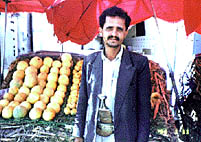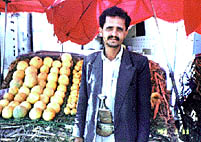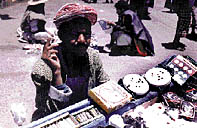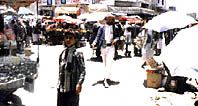
Peddlers Striving for Livelihood [Archives:2000/17/Reportage]
April 24 2000
By: Mahyoub Al-Kamali
Gazing at an oft-quoted phrase “Towards granting a Humanitarian Touch to Globalization,” a peddler wonders if he has anything to do with it. He in lost in thought, “Will I be able to ensure two square meals for my family? Will I be free from the constant trouble triggered by the Municipality employees?” All these question-marks and worries pops up in his mind while the future seems to be too insecure and elusive for him.

These peddlers have no doubt about the government’s intentions and abilities to pass suitable laws and plan public welfare policies. So they fondly hope it will be able to protect them from rapacious municipality employees who usually rob them of their little earnings. They are using honest ways to earn their living; they have not resorted to violence or committed kidnapping to blackmail the government. These innocent individuals are the hapless victims of destiny. They could not help taking up this way of earning, especially in view of he deplorable economic conditions. These peddlers’ concerns and worries aggravate during rainy seasons for their sales decrease considerably. The idea of allocating a marketplace for them would not make their condition any better because they may not get enough customers there. Peddlers merchandise are promoted more at street corners and squares of the towns than in narrow kiosks in a market complex.

It is no doubt true to say that those in charge, if they have the will to help relieve these people’ suffering and protect them from these greedy employees devoid of any sense of humanity. Besides being made to pay the hefty fines arbitrarily imposed on them, they have to satisfy and bribe these employees every now and then. What really breaks one’s heart is the fact that those in charge are turning a deaf ear to the criminal acts of these employees. Statistics give a scary picture of the situation revealing that about 25.3% of work force have taken to street vending. In addition to that, most of these peddlers are suffering from different health hazards and 55% of them are illiterate. Moreover, these miserable are supposed to support families reaching to 117% rate.

The point that our officials should focus on is not to make them easy victims of the heartless municipality employees but to try to relieve their suffering by creating more job opportunities, training them and making them able to adopt other activities. No matter how many campaigns are conducted by municipality employees to remove peddlers from the streets, it is quite impossible for peddlers to stop this activity mainly because it is the only means they got to live, otherwise they and their families will die out of hunger. Therefore, such actions are just meaningless and futile to end this ever-increasing phenomenon. If the authorities are really committed to eradicate this phenomenon,they have to plan out and put forward an agenda of action to create job opportunities for those who could not find jobs and to establish training centers to train others making them productive rather than a heavy burden on the society.
The Social Fund Development and Work Departure has eventually been established to deal with the consequences of the economic and financial reform program and to relieve the problem of unemployment. The fund was supported by the World Bank with $ 40 million, a $ 20 million grant by the European Union and $ 10 million granted by Holland government.
The terrible condition of these people makes all wonder about the fund outcome of the different national as well as international organizations working to alleviate poverty and allay its grave for reaching consequences.
——
[archive-e:17-v:2000-y:2000-d:2000-04-24-p:./2000/iss17/report.htm]


